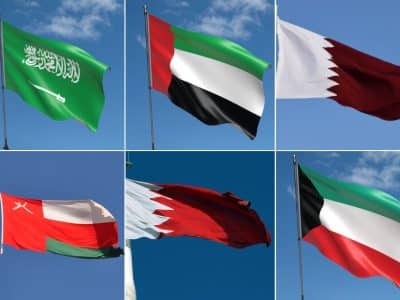Growing up during the Iraq-Iran war, Reza Marvasti understood firsthand the value of play, which was what eventually led him to create The Power of Play, an NGO that builds sustainable playgrounds for children in underprivileged communities all around the world, for which he is the founder and CEO.
Born in Iran during the Iraq-Iran war, Marvasti described the first six years of his life as being filled with “chaos and a lot of darkness.”
But even during the darkest days of the war, when he and cousins were hiding in a dark bomb shelter, there were opportunities for play recounted Marvasti, speaking in the latest episode of Spencer Lodge Podcast, sponsored by Arabian Business.
“I remember they would tape up the windows in case they shatter and it had this darkness. But for me, as soon as everything would go dark, it was time for me and my cousins to play hide and seek and play our games. So we had a playtime during the war,” said Marvasti.
At the age of 19, Marvasti moved to Canada where he got into extreme sports, becoming a professional extreme athlete.
“Growing up I’ve always looked for the thrill and got into lots of extreme sports. To be frank, I was an adrenaline junkie and I needed that rush,” he said.
But it was after getting into a life-threatening accident while speed flying (a hybrid sport that combines elements of paragliding and parachuting) that Marvasti decided to switch gears and go into a journey of self-discovery to find his purpose in life.
“As I was trying to just cope with this [the accident] and understand it, few days later, a friend of mine, Kyle, who got me into this sport had a similar accident and passed away a week before his daughter was born,” recounted Marvasti.
“This got me to start thinking what I am doing here. I had this thought that I somehow took Kyle’s spot; he was not here for his daughter and once again, life is giving me this opportunity. Is there a calling for me or is it just for me to have more fun and giggles? That’s when I went on a quest to find my calling and see, who am I? What am I doing?” he explained.
This quest took him trekking to the Amazon forest where he associated the thick foliage- induced darkness with the dark days of his childhood during the war, making him recall those days and how he dealt with them.
“Play was my light play, my escape, my freedom. So I was like this is the light that I had which guided me through what I had to go through and I want to pass it on. It was at this time when I really understood that I am here for the kids. Kids are the future and nothing is more meaningful than being there for those little innocent humans,” said Marvasti.

“After the accident, and Kyle passing away, I started carrying this guilt that I took his spot. And then when I was there [in the Amazon] I was just thinking about it and about my own childhood. I got those visions of my childhood and remembered things getting dark and feeling alive when playing and running around. That was where everything clicked,” he continued.
Once he left the Amazon, Marvasti went to Bolivia and lived with street kids where, seeing how those children were dealing with challenges meant for adults, he grew even more convinced of the importance of play in children’s lives.
It was then that he decided to start building playgrounds for children. Finding that there were no existing nonprofit organisations that did it, he started Power of Play, consulting with experts on where in the world those playgrounds were most needed.
This took him first to an orphanage in Uganda and then across the African country to a refugee camp where he built his first playground.
“That very first playground was by far the most challenging playground. We had days where 5,000 children came to play so you can imagine this shortage of everything. Even for tires [used for play], I had to just drive around all these villages to try and find them. We had no tools so we went all around to a few villages until we fiund a drill with the twist,” he recalled.
Despite the difficulties, Marvasti and his team persevered until the succeeded. “And once it was built, I loved to sit back and watch the children play and see that joy and laughter,” he said.
“I chose the responsibility of being the person to create a space for kids to be kids. I’m so grateful for everything that happened to bring me to where I am today,” added Marvasti.
Over the past five years, The Power of Play has built 34 playgrounds in 11 countries, partnering up with a country’s local NGOs and stakeholders to get things moving.

Marvasti said he is “still doing” The Power of Play “voluntarily so making a living has always been a struggle.”
“It’s definitely not sustainable. It’s not easy but at the end of the day, I am so fulfilled and content that I don’t want it any other way,” said Marvasti.
“The way I look at it is all we have in life is time, right? We put the time to work and the work gets converted to money to buy things so we can get that happiness. I think I’ve got a shortcut: I’m just using my time for the happiness,” he said.
Asked about the future of The Power of Play, Marvasti said he dreams of the day he “works himself out of a job.”
“I’m really looking forward to the day that we can close the Power of Play because every child has the opportunity to be kid. It’s what every kid deserves. During play, kids connect with each other, and learn how to socialise, they learn their boundaries etc,” said Marvasti.
Many of the children that Power of Play caters to are dealing with trauma of child trafficking or having been child soldiers and it is amazing how through play, they get to regulate their emotion and deal with this stuff. That’s the way I believe, to make our world a better place,” he continued.







